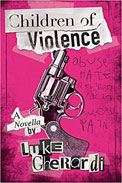
 |
The only way teenage Gracie's father shows her love is to kill the middle-aged man who tries to seduce her. Murder comes naturally to this suburban businessman, who, unbeknownst to his neighbors, is also a mafia hitman. His brutishness is only on display behind closed doors. Reeves' mother may seem like a devout Christian, but she's really a brainwashed cult member indoctrinated to fight and kill for God. Not all family violence is so well hidden. Robbie is the son of a drug-addicted prostitute and personal punching bag to her rageful pimp boyfriend. Young Cole's mother and infant brother died, leaving him at the mercy of his drunken father, whose best days as a soldier in Afghanistan are far behind him. These four kids' paths cross in a final bloody showdown. It may leave them as scarred and jaded as Paw Paw, Robbie's elderly protector—if it doesn't first kill them outright.
Gherardi here emphasizes both the subtleties of some forms of violence and the egregiousness of its other manifestations. Women as recipients of violence is a common theme, whether they are physically assaulted, defamed with racial slurs, or, like Reeves' mother, married to secretly gay men who use them as beards. Some of those characters who survive childhood respond to their past traumas in various ways. One commits suicide. Another marries happily and has a child. Yet another fades out of the plot after a change of living situation for the better. This disappearance reflects the way some people lose contact in life, never to reestablish it. The only character who acknowledges the pervasiveness of violence in his world is Gracie's father in his final moments. This novella may find a welcome audience with teens in violent living situations and middle and high school English teachers.